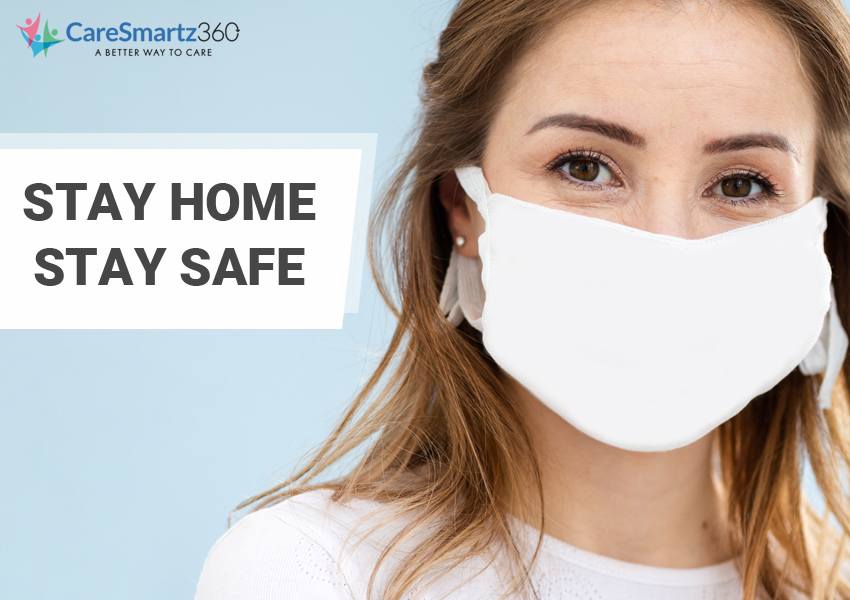Self-Isolation Guide for COVID-19

The novel coronavirus has taken the world by storm and every country is putting forth their best possible efforts to control the pandemic.
With millions of people quarantined and locked down in their homes, the COVID-19 outbreak is perhaps one of the biggest crises of all times.
Since social distancing and self-isolation are the primary ways to prevent the spread of the virus infection: everyone should be aware of the right ways to practice the same.
Whether it is a COVID-19 patient or someone with mild symptoms, ensuring adequate preventive measures should be the highest priority.
Here’s a quick guide for the elderly, caregivers, and individuals with COVID-19 symptoms regarding self-isolation that everyone ought to know.
What is Self-Isolation?
You often hear this term these days and may not be aware of self-isolation and the aspects associated with it.
Self-isolation is a preventive measure to control the spread of infection from an infected person to a healthy person. This practice includes staying at your home in your room for a minimum of 14 days (in case of COVID-19) and restricting visitors & restrict outdoor activities.
If the person feels better, there’s no need for considering medication or hospitalization. Just in case the symptoms worsen, the individual must immediately seek medical attention. Here’s what it’s mainly about:
- Staying at home
- Remaining in your room with windows open
- Not sharing your towel
- Restricting visitors outdoor activities
- Adequate use of Personal Protective Equipment (PPE)
- Social distancing from family members, caregivers, and pets
- Following the strict diet, exercise, and medication (if prescribed) schedule
Self-Isolation To Do’s
Here’s what people need to do when they are self-isolating themselves to ensure they prevent the spreading of the virus and to improve their symptoms.
Restrict Movements
If you are facing symptoms associated with COVID-19 or have a travel history of a country dealing with the outbreak, it is essential to stay at home.
One should understand that the infection could quickly spread to healthy individuals through various mediums. Either it can be through the air (if an infected person coughs or sneezes without covering the face) or even through exposure to a contaminated surface.
- Stay home for a minimum of 14 days
- Use personal protective equipment including masks, gloves, and hand sanitizer
- Never share your items
- No shopping, even for medicines or groceries
- Ask caregivers or other family members for outdoor tasks
- Inform the nearest hospital if symptoms worsen
Regular Room Cleaning
Staying isolated doesn’t only mean to stay away from others; you need to maintain proper hygiene and cleanliness around yourself.
The objects and areas of the room that are frequently touched must be sanitized and cleaned appropriately to avoid any chance of contamination.
Also, one should avoid sharing objects like cell phones, chargers, books, and other similar objects with the family members as it may increase the risk of contamination.
Focus on Healthy Diet and Stay Hydrated
Your diet plays a crucial role in your overall health and recovery from COVID-19 infection. One should stick to a balanced diet as prescribed by their medical professional if they are witnessing the symptoms associated with the disease.
Also, staying hydrated is yet another important aspect to fight the illness. It is advised to consume plenty of warm water throughout the day, which has a great effect on improving the symptoms even if you aren’t infected.
Don’ts of Self Isolation
Avoid Close Contact
While you are at your home in your room, you must avoid close contact with your family members or caregiver.
Maintain a minimum of 6 feet of distance while you are talking with anyone and cover your mouth properly with a face mask by ensuring the adequate fitting.
Also, it is important to maintain adequate distance from your pets as they may spread the virus among others.
Don’t Share Your Clothes and Towel
Make sure your clothes and towel aren’t being shared among other members of the home especially children. This can lead to contamination.
Also, proper cleansing of your clothes, bedsheets, towels, and handkerchiefs is important using a good detergent and a disinfectant. The family members or the caregivers need to pay close attention to the laundry and ensure the patient’s clothes are washed and dried separately.
Don’t Use Public Transportation
It is essential to stay at home for a minimum of 14 days if you are suspected of COVID-19 or have developed symptoms. One should strictly avoid public transport and stay at home.
If there’s a need to go outside, prefer personal convenience, and use facial masks and gloves. Properly sanitize your hands after you reach your destination and avoid touching common areas.
Don’t go to Public Areas
Those with COVID-19 symptoms should avoid visiting parks, grocery stores, or medical stores to avoid the spread of the infection. Most of the people ignore the importance of staying at home, which increases the risk of contamination for others.
If there’s something important, one should seek help from acquaintances regarding any purchases or outdoor tasks. This will ensure that you don’t come in contact with others.

